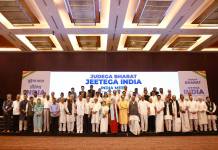Over the last couple of weeks, the joint venture of Dassault Aviation and Anil Ambani’s Reliance has created quite a storm in India after the Congress party made allegations of a huge scam in Prime Minister Narendra Modi’s decision to purchase 36 Rafale fighter aircraft in flyaway condition.
As originally reported by Janta Ka Reporter (Part 1 and Part 2), Anil Ambani’s newly formed Reliance Defence had struck a joint venture with Dassault Aviation that sold Rafale within 10 days of Modi announcing the deal. It looks like Gautam Adani, another close friend of Modi, too is keenly following in the footsteps of Anil Ambani in benefiting from the prime minister’s shopping spree in the defence sector.
A newly created alliance between a Swedish arms manufacturer and Adani Group is aiming for a much bigger pie while India is planning to spend a whopping $250 billion to modernise its armed forces.
Sweden’s defence firm, Saab, tied up with India’s Adani Group as recently as September this year. But considering the past records of these two companies, there is a strong possibility that their aggressive pursuit to sell arms to the Indian armed forces might create another big corruption scandal soon.
Saab, with the help of the collaboration with Adani is aiming to win its bid against Lockheed Martin to sell more than one hundred Gripen fighters to the Indian air force. In October 2016, the Indian Air Force had issued a request for information (RFI) from the major fighter jet manufacturers to send in their offers to sell warplanes worth $25 billion, which is thrice a bigger deal than what India had agreed to spend on purchasing 126 Rafale jets.
After scrutiny, India’s defence ministry narrowed down the competition to Saab’s Gripen E and Lockheed Martin’s F-16 Block 70. To satisfy Indian demand, Saab has reduced its offer price and even offered to build these single engine fighter aircrafts in India. Moreover, to outsmart its competitor Lockheed Martin, Saab has created a joint venture with Adani Group. Saab, after getting Adani on board, is so confident of getting this deal that it brought all its international partners and suppliers to Delhi on 31 October this year for a two-day Gripen Indian Partnership Summit 2017 to connect with selected Indian industries. Besides, eyeing for this major deal, Saab in collaboration with Adani Group has also announced its intention to sell UAVs and helicopters to the Indian military.
Saab’s questionable past
Since early 1940s, Saab has been selling military aircrafts, so there is nothing unusual about the bid by the Linköping-based group for the billion dollar arms deal in India. However, Saab has been involved in a number of scandals as it sold fighter jets to other countries. Its sale of 29 Gripens in 1999 to South Africa has been scandalous due to allegation of payment of huge bribes. The sale of 24 of the same fighter jets to the Czech Republic in the last decade has also come under suspicion of corruption. Its deal with Hungary too came under the scanner of potential corruption.
The recent purchase of Gripen fighters by Brazil in the middle of its economic crisis also smacked of ulterior motives other than the official reasons of technology transfer in defence sector. Thus, controversy-prone Saab’s decision to partner with India’s equally controversial Adani Group raises a number of pertinent questions about the methods it may adopt to procure the contracts to sell military hardware to India worth billions of dollars.
Middlemen replaced by crony capitalists?
Arms deals have been contentious in India because of the Indian law forbidding any payment to middlemen. However, the reality is that it is simply not easy for foreign arms manufacturers to be able to sell something in India without paying bribes to generals, bureaucrats and politicians. It appears that after coming to power, the Narendra Modi government has attempted to accord a somewhat official sanction to these ‘middlemen’ by encouraging its favorite business houses in India to create their own arms manufacturing units in the name of ‘Make in India’.
This policy has seen the Ambanis and Adanis to formally enter into the arms market without having any previous experience in this sector. It can’t be a mere coincidence that Adani decided to enter the defence sector barely few months after Anil Ambani formed his defence company and little over a year before the Modi government made the RFI worth $25 billion public. Adani Aerospace Defence Sytem was incorporated in March 2015, just three months after Anil Ambani’s Reliance Defence came into being.
Ambani’s joint venture with Rafale is already under the cloud of a potential corruption scandal. Moreover, the Bofors scandal of 1980s, for the alleged payment of kickbacks when Sweden in its biggest arms deal ever sold 410 field howitzer guns is still politically volatile in India. If Saab manages to get the contract with the help of Adani, this deal no doubt will give rise to suspicion for what could to be the mother of all corruption scandals related to India’s armed forces purchases.
Adani Group’s own questionable pedigree
Gautam Adani led $12 billion Adani Group is one of the India’s largest conglomerate with business ranging from oil and gas to real estate, from ports to logistics but it is also a very new player in the arms sector. The Adani Defense Systems & Technologies Ltd, with which Saab is collaborating has been officially registered as recently as in March 2015. Group Chairman Gautam Adani’s closeness to India’s Prime Minister Narendra Modi is well known and the rise of his business empire is closely connected to Modi’s political rise. While Modi was Chief Minister of the Indian state of Gujarat from 2002 to 2014, Adani has allegedly been his primary backer and main financier. His fleet of private planes and helicopters were used extensively by Modi to campaign in the last Parliament election. The relationship has bonded further after Modi became the Prime Minister in 2014. Adani is the only businessman who regularly accompanies Prime Minister Modi on his foreign visits.
Adani’s rag to riches story also has a huge share of controversies. Adani Group has been accused of money laundering and tax avoidance by Indian authorities, but his political connections have allegedly protected him from actions being taken. The Adani family is also named in the Panama Papers leak. Adani Group’s massive $16.4 billion proposed coal mine project in Queensland, Australia for export to India’s power stations has led to one of the biggest and sustained mass protest movement under the banner of ‘Stop Adani Alliance’ in Australia. On 7 October 2017, nearly 16000 protesters had gathered in 45 locations in Australia gathered to oppose this project on the grounds of environmental concerns and planned government subsidy. A poll claims that more than half of Australians oppose Adani’s mining project.
Stop Adani protest in AustraliaSaab’s partner Adani Group is not only politically tainted in India but also internationally despised. Moreover, its short history in the business of arms manufacturing has been deeply controversial. In one of the South Africa’s worst political scandals, the leaked emails from Gupta business empire, which is close to President Jacob Zuma, suggest that Adani had made a deal with Indian origin Guptas to grab a big portion of intellectual property of South African state arms manufacturer Denel in spite of the opposition from the South African national treasury. In 2016 subsidiaries like Denel Asia and Denel India were created to bypass the South African law, but the media expose stopped the Adani’s from carrying out this daring plan.
Adani Group has also formed a joint venture with Israel’s Elbit-ISTAR to produce drones, which Indian military is trying to procure to use it in its insurgency affected areas from Kashmir to Northeast and even in its Red Corridor. Moreover, Adani Group is also reported to have business links with the Italian arms manufacturing company Elettronica, whose name too featured in ‘Panama Papers’ leak for allegedly paying commission in India.
Undoubtedly Adani Group has a very short and extremely controversial profile in the arms business. In this context, questions are bound to be asked if Saab, which too has been linked to several arms-deal corruption scandals all over the world, selected Adani as partner for its arms manufacturing projects in India purely on the basis of its business record or technological merit. Or is it because Saab wants to make use of Adani’s close proximity to Prime Minister Narendra Modi in order to influence the Indian political class and arms procuring agencies to beat competitors in the game?
Even after three decades, Sweden’s bilateral relations with India still have not recovered from the Bofors scandal. Swedish authorities, instead of learning from past experiences, are doing whatever they can to push for the sale of the Gripen fighters.
A number of reciprocal visits of high level ministerial delegations have taken place in recent months to push this agenda. It was in 2008 that a Swedish diplomat together with his Danish counterpart had reached out to Modi defying the unofficial EU travel ban on him for his alleged role in 2002 riots.
Swedish PM Stefan Löfven with Modi during his visit to Mumbai last yearLast year, in the ‘Make in India’ industrial fair in Mumbai, Swedish Prime Minister Stefan Löfven had taken part as a special guest. Sweden is hoping that with the Adani connection it will be able to sell its Gripen fighters to India. But, considering the past records of Saab and Adani Group in arms market, even if their bid succeeds, India and Sweden are bound to get entangled in another huge corruption scandal.
Adani Group issued a full statement in response to the above story. We are carrying them in full below.
A spokesperson for the group said, “Adani Group’s foray into defence is in continuation of its vision of nation building. The Group is keen to play an instrumental role in helping transform India into a destination for world class high-tech defence manufacturing. With Make in India, India is making a genuine attempt to balance services and agriculture based economy with industrial manufacturing, with an intent to build sustainable capabilities, reduce import dependence, and most importantly generate employment for the youth.
DPP 2016 reflects a fundamental change in mindset of the policymakers with inclusion of IDDM emphasizing indigenization, private sector to complement and co-exist with DPSUs and help reduce dependence on imports. SP policy released by Ministry of Defence in May 2017 as part of DPP 2016, allows the private sector to participate in design, production and system integration of submarines, helicopters, fighter crafts & armoured vehicles. All large conglomerates including Mahindra, Tata, Adani, L&T, Hero, Reliance, Kirloskar, Bharat Forge, tier 1 and tier 2 companies including Dynamatics, SEC, RVD, have stepped up their presence and investments in the defence sector in the last three years.
As per SP policy, the foreign OEM shall tie up with private Indian players for manufacture of these platforms with transfer of technology. The collaboration between Adani Group & Saab has been done under the aegis of the same policy, focused on developing the wider defence and aerospace ecosystem in India. Tata announced a similar collaboration with Lockheed Martin in Jun 2017 for production of F-16s in India.
On UAVs, Indian tri services led by IAF issued an open RFI in Jun 2016 for procurement of MALE category Unmanned Aerial Systems under Make in India initiative as per DPP 2016 acquisition process. Adani and Elbit submitted a response as many others, against the same RFI expressing willingness to design, produce and maintain Hermes 900 in India.
Adani Group had exploratory discussions with Denel in 2015, however the Group was neither comfortable with the partners involved nor with the proposition. Hence, the discussions were not progressed by Adani Group. This is common in any business where everyone talks to everyone but business is pursued only after rigorous due diligence. Adani Group has no relationship with Denel.”
(The writer is professor of Peace and Conflict Research at Uppsala University, Sweden.)
















